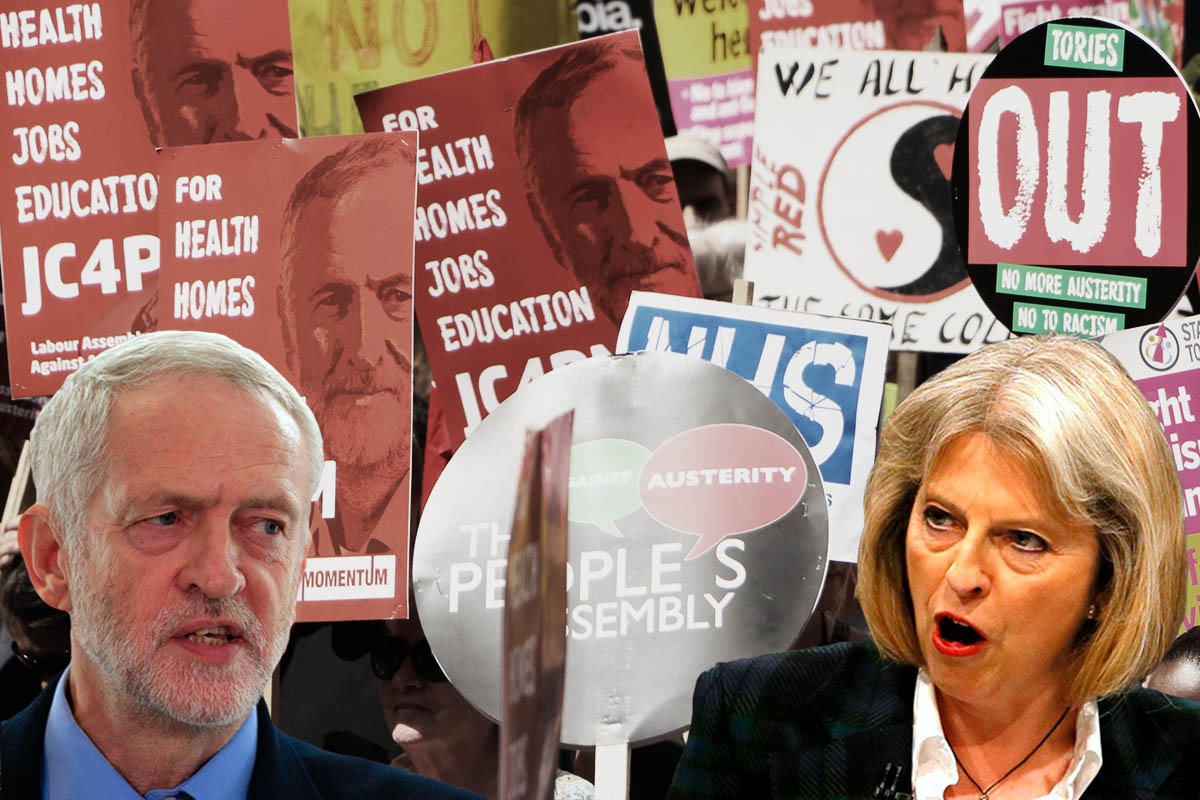In the first of a three-part analysis of political developments in Britain, we look at the crisis of British capitalism and its reflection in society – as seen by the Brexit vote, the rise of strikes, and the anger against the establishment.
We publish here an in-depth analysis of the political situation in Britain, which was discussed at the recent conference of Socialist Appeal supporters.
Although originally drafted in December, the processes and contradictions that this document outlines still lie at the heart of British politics.
In this first part, we look at the long-term crisis of British capitalism, the implications of Brexit, the movement on the industrial plane, and the ever-growing anger towards the elite.
The despair and pessimism of the bourgeois everywhere is a reflection of the crisis of the capitalist system, which has reached an impasse.
Marx explained that the key to the development of society is the development of the productive forces (industry, technique science, etc.). The present crisis shows that capitalism is unable to develop the productive forces as it did in the past. At this point society enters into crisis, creating the objective conditions for social revolution.
These are the objective reasons for the decisive changes that are occurring in Britain and on a world scale. The world situation is characterised by extreme turbulence, economically, politically, and socially. This extreme volatility has arisen from the terminal crisis of the capitalist system.
The effects of the slump of 2008 are still being felt with austerity policies ruthlessly applied all over the world. This is the reality 10 years after the slump, and with no end in sight. The so-called recovery is the weakest in history, an indication of the seriousness of the crisis. Living standards are being driven down as a consequence and the working class is forced to pay for the crisis.
This organic crisis – organic in the sense that is deeply embedded in the foundations of the capitalist system – is having massive consequences politically.
The rise of so-called ‘populism’ in one country after another is a reflection of this. The unbridgeable gulf between rich and poor has never been so wide, resulting in a burning resentment. The middle ground is shrinking, and class polarisation is growing, expressing itself in violent swings to the left and to the right.
In different ways the rise of Donald Trump and Bernie Sanders in the United States is a reflection of this crisis, as is the rise of Corbyn in Britain and Melenchon in France. The growing anti-establishment mood and the fracturing and collapse of traditional parties are all symptoms that the old political stability has come to an end.
The attempt by the bourgeois to restore the economic equilibrium has destroyed the political and social equilibrium. A new epoch of instability has opened up, which is pregnant with revolutionary implications.
The traditional parties, both bourgeois and social democratic, are in crisis. In France, not one of the traditional parties of French capitalism made it to the second round in the presidential elections. In the recent general election in Germany, the Christian Democrats and the Social Democrats had their worst result since 1949, and for the first time the Alternative for Germany, a right-wing anti-immigrant party, has entered parliament.
There is a similarly unstable picture elsewhere. In Britain social democracy (in the form of the Labour Party) is in the ascendency and likely to come to power in the coming period. But this is a result of a sharp move to the left under the leadership of Jeremy Corbyn – a phenomenon that itself is a striking example of the process of radicalisation that is taking place beneath the surface everywhere.
The 1930s and now
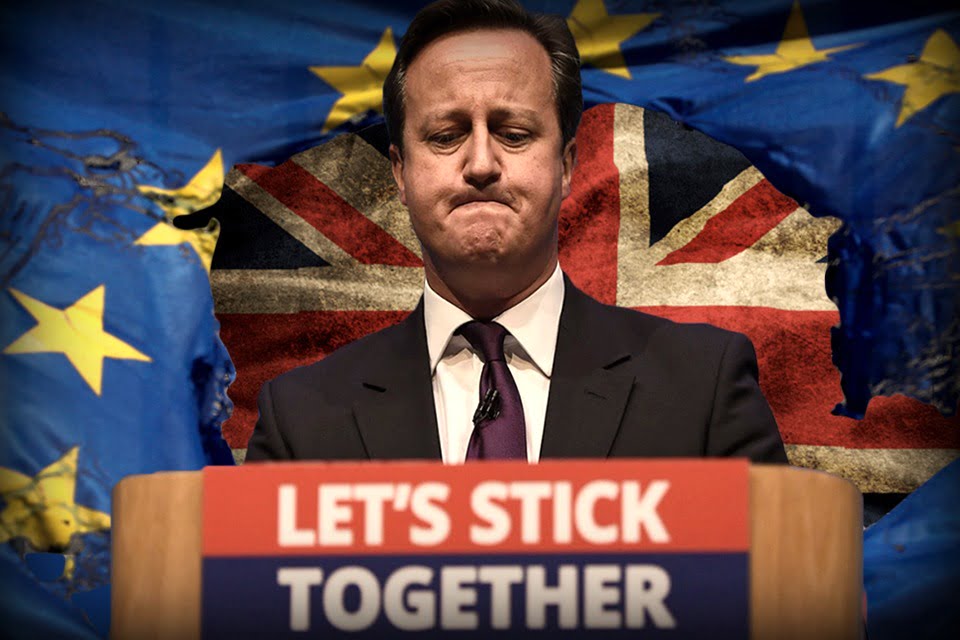 History does not repeat itself exactly, but it is clear that we are entering a similar period in many ways to the stormy 1920s and 1930s, which Trotsky characterised as being a pre-revolutionary situation. His book Where is Britain Going? is perhaps the best way to understand the implications as well as the tasks that face us in such a situation.
History does not repeat itself exactly, but it is clear that we are entering a similar period in many ways to the stormy 1920s and 1930s, which Trotsky characterised as being a pre-revolutionary situation. His book Where is Britain Going? is perhaps the best way to understand the implications as well as the tasks that face us in such a situation.
At that time Britain was rapidly entering a period of upheaval. The defeat of the 1926 General Strike had resolved nothing. The left split from the Labour Party in the early part of 1932 and the evolution of the Independent Labour Party to the left was a confirmation of this fact. The slump, the rise of Fascism in Germany, and the MacDonald betrayal, all served to propel the ILP sharply from a left-reformist party to a centrist one – that is, a party that is Marxist in words and reformist in deeds.
But while there are certainly many parallels with the 1930s, it is important to understand that there are also clear differences. At that time Britain was a world power with a large empire. Today, Britain is a second-rate power, its influence and economic power much diminished.
In the 1920s Stanley Baldwin, the Tory leader, remarked that Europe was a lunatic asylum. This reflected the smug approach of the British ruling class which regarded themselves as superior to their European cousins. Trotsky retorted that England was nothing but the last ward of the European madhouse, a ward reserved for particularly violent cases.
Today, it is Britain which is regarded as a lunatic asylum by the European bourgeois. They cannot understand the madness that has gripped the British political establishment, which found its most striking expression in the Brexit referendum. It was a reflection of the degeneration of the political representatives of capitalism, who were prepared to gamble the country’s fate for the short-term electoral interests of the Tory party.
David Cameron gambled with the future of the country and lost. As a result Britain has been turned upside down. The implications are extremely serious. Not so long ago Britain was one of the most stable countries in Europe; now it is one of the most unstable. From the fastest growing economy in the G7 (spurred on by artificial means, such as consumer credit) it has become the weakest.
The crisis of British capitalism
 In reality, British capitalism experienced a long and protracted decline throughout the 20th century. This decline was masked by the world economic upswing of the post-war period and the consumer booms of the pre-2008 period. But the present crisis has cruelly revealed the real extent of the British disease.
In reality, British capitalism experienced a long and protracted decline throughout the 20th century. This decline was masked by the world economic upswing of the post-war period and the consumer booms of the pre-2008 period. But the present crisis has cruelly revealed the real extent of the British disease.
This has come as a profound shock. Living standards have fallen constantly over the last decade and the idea of returning to the “good old days” has vanished. There is general despondency and despair about the future affecting all classes.
In particular, pessimism has gripped the ruling class and its political representatives who have been seized by a kind of paralysis of the will, disoriented and hopelessly divided.
A lack of investment over decades lies at the root of the relative decline and crisis of British capitalism. Workers in Britain today produce an average of 30% less per hour than their French and German counterparts, and even 9% less than workers in Spain.
Relative to German manufacturing, Britain – the former “workshop of the world” – employs just one third of the number of robots per head of workers, and only half as many as Italian manufacturing!
These figures show how deeply rooted the problems facing British capitalism are. Such an outcome is the product not of years but of decades of lack of investment and of relative decline in the productivity of British capitalism, which is now turning into an absolute decline.
All this reflects the deep crisis of British capitalism. The spurt of growth of a few years ago has completely run out of steam, leaving the UK in a very weak position. All the economic forecasts from the top institutions have been downgraded from those of a year ago.
The latest forecast to arrive is from the European Commission which now believes growth in Britain will be among the lowest in Europe, projecting a mere 1.1% growth in 2019. Growth is “expected to remain subdued over the forecast horizon,” it said. This coincides with other assessments from the International Monetary Fund and the Bank of England, all of which have lowered their growth predictions.
This European Commission forecast is based on the maintenance of current trade relations. This is far from guaranteed, to judge by the state of the Brexit negotiations. But even leaving this ‘small’ detail aside, UK growth is still expected to be very low, while business investment will “remain subdued following a period of heightened uncertainty”.
Poverty amidst plenty
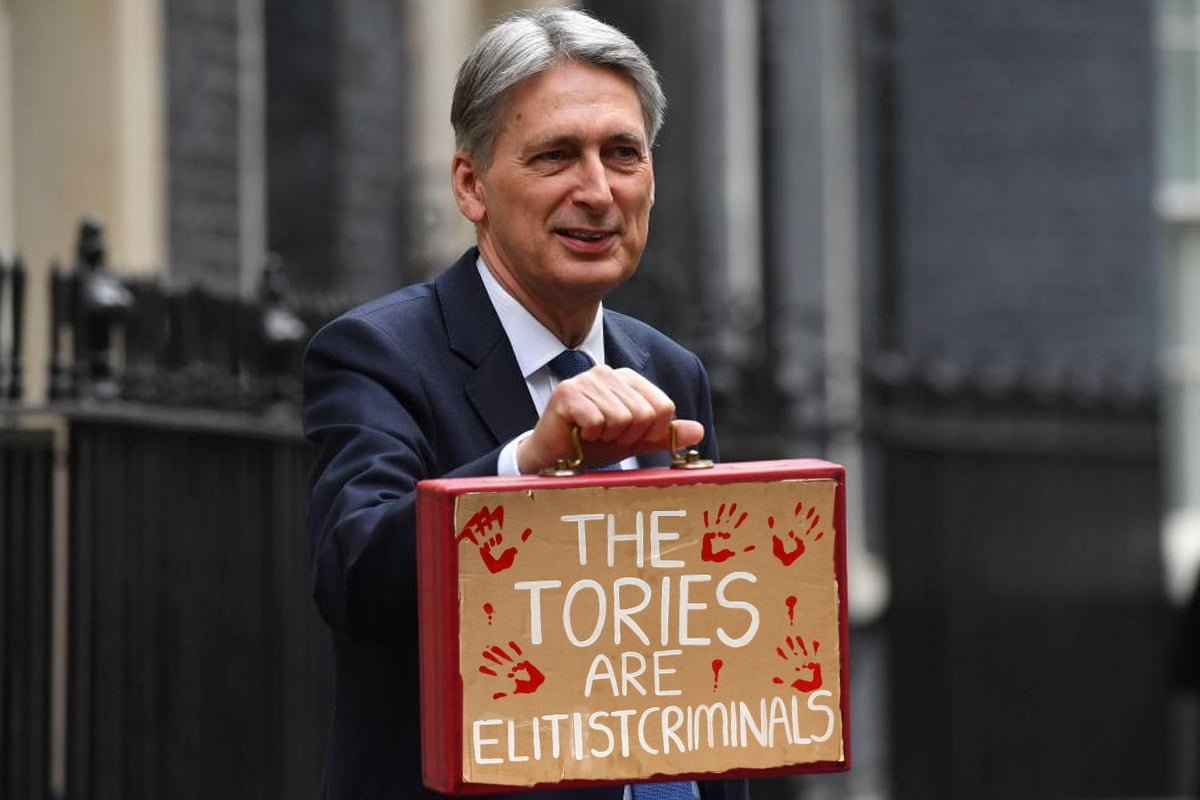 This fact is of key importance: without a flow of investment into new machinery, buildings, new products, etc., there can be no recovery.
This fact is of key importance: without a flow of investment into new machinery, buildings, new products, etc., there can be no recovery.
Investment is the lifeblood of a capitalist economy. But business investment only grew by an annual rate of 1.3% in the third quarter of 2017. There is plenty of cheap money around but no investment. Big business is sitting on a cash pile of £700bn.
How can one explain this apparent contradiction? The reason is very simple. Why bother to invest when there is excess capacity (over-production) and weak demand? This is particularly the case given the uncertainty over Brexit.
Cheap money is being used to buy up assets and buyback company shares, producing speculative bubbles in the economy, instead of being used for productive investment. Net export growth is also expected to “moderate marginally”, states the Commission report. This paints a very gloomy picture for the British economy and future living standards.
With inflation rising to 3.2%, the Bank of England has been forced to raise interest rates for the first time in 10 years – that is, since the outbreak of the world crisis. The interest rate now stands at 0.5%, which is still the lowest level for 300 years, apart from the 0.25% rate maintained for the last 12 months. This will cause great difficulties when the next slump comes, as they will not be able to reduce interest rates substantially as they did in 2008.
The official unemployment figures are the lowest for 42 years. But they fail to take into consideration the high levels of underemployment and bogus employment. And even the jobs growth has come to an end according to recent figures. Moreover, the jobs being created are often low-wage, low-skill jobs. Some workers have to take two or three jobs to make ends meet.
It is more cost-effective for the capitalists to employ cheap labour than invest in new technology; that is why productivity growth (the hourly output of workers) has been falling. UK productivity growth is at the lowest level for 200 years – a truly astounding fact. Without the necessary investment in high-skilled jobs, this will remain a permanent feature of the British economy, which will be a drag on living standards.
Meanwhile, the decline in real wages over the last decade is unprecedented in modern times. According to the head of the Institute of Fiscal Studies, Paul Johnson, such a fall has not been seen since 1750 and the beginning of the Industrial Revolution.
“Mr Hammond’s challenge,” states Paul Johnson, “is that we’ve had the worst decade of income, earnings and productivity growth and he remains constrained by the economic and fiscal situation amid a mass of uncertainty caused by Brexit.”
With inflation rising and energy bills rocketing, the mood of the workers is becoming increasingly bitter and angry. But that mood is not reflected in the union leaders, who are doing everything possible to prevent militant action.
The Brexit dilemma
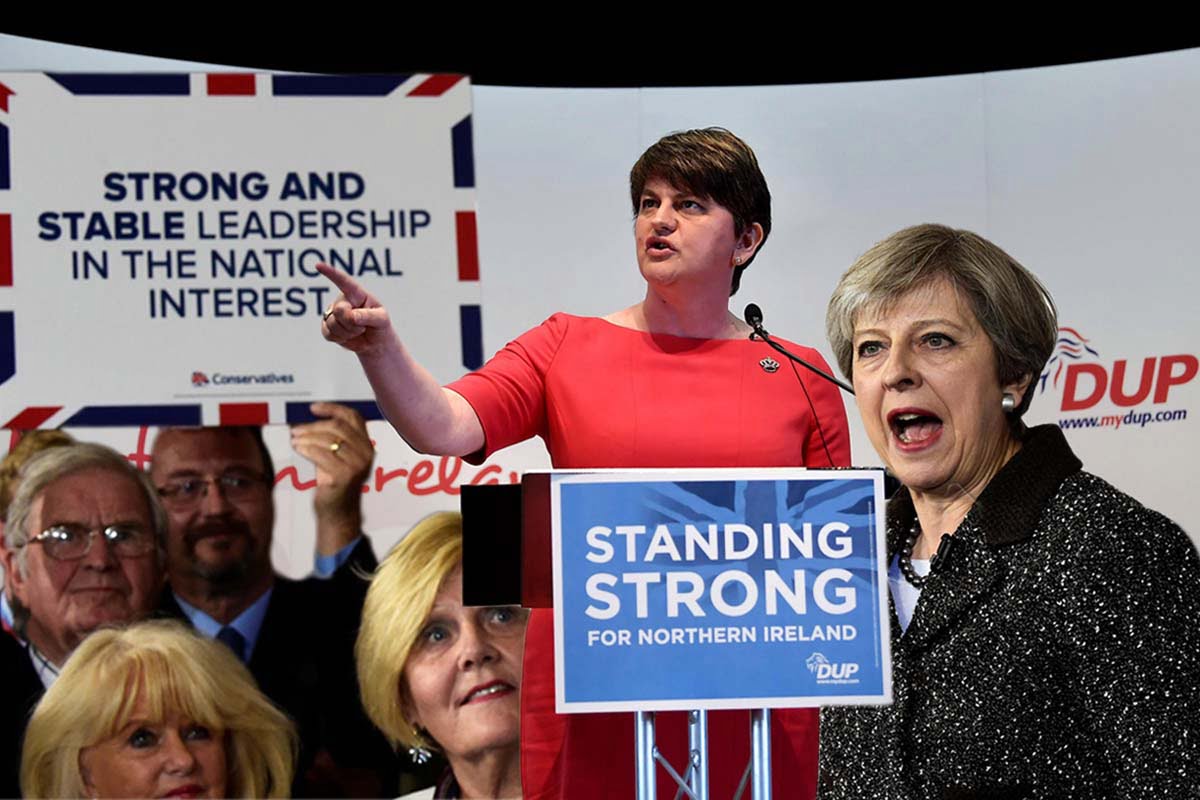 The Brexit decision has exposed the real rottenness of British capitalism. The Marxists have explained that inside or outside of the European Union, the working class would face further deep cuts in living standards. We only need look at Greece to confirm that.
The Brexit decision has exposed the real rottenness of British capitalism. The Marxists have explained that inside or outside of the European Union, the working class would face further deep cuts in living standards. We only need look at Greece to confirm that.
But Brexit has certainly accelerated the crisis. British capitalism has 45% of its markets in Europe. If tariffs are imposed on British goods, it will have a very damaging effect on trade. There is no serious alternative to the European market, despite the assertions of the Brexiteers. There are no huge markets queueing up to embrace British capitalism. Under present conditions where demand is squeezed, every capitalist power is engaged in a struggle for markets.
Theresa May has temporarily papered over the cracks in a fudged statement of intent, but this has only postponed the conflict for a short period.
The question of the Irish border has not been resolved and still has the potential to scupper the final deal. The DUP were prepared to swallow an ambiguous form of words. But as soon as things become clear all hell will break loose. May has simply kicked the can down the road.
Brexit is bringing to the fore many of the contradictions that the British ruling class have entangled themselves in in Ireland. In the Stormont elections and general elections in 2017, voting was more polarised along sectarian lines than it has ever been. The collapse of the Northern Ireland Assembly revealed that the political process at Stormont has stalled and lies discredited in a dead end of sectarianism, austerity and corruption.
The British ruling class were happy to ignore this troublesome little corner of the world as long as it was feasible to do so. That is no longer the case as the crisis of capitalism gives all of the contradictions there an acute form.
When the Tories lost their majority and the DUP came to May’s rescue, these contradictions were given the main stage and even the potential to blow apart all May’s plans. As far as the DUP’s Brexit stance is concerned, it is pure demagoguery along the lines of the Brexiteers of the Tory Party. They want an end to immigration and EU interference but have no interest in a hard border. How such a circle can be squared is anyone’s guess.
Meanwhile, the Irish bourgeois are increasingly lining up with the EU against a beleaguered British capitalism. Leo Varadkar – for his own reasons – has taken an unprecedentedly hard stance against Britain and is taking an increasing interest in the politics of the North, to the greater chagrin of the DUP.
All of this is turning Northern Ireland into an unexpected but potentially very serious political, social and even diplomatic flashpoint for the British capitalist class. The Good Friday Agreement is in tatters.
The idea that Britain can negotiate a trade deal that will offer all the advantages and none of the disadvantages is utopian. The negotiations with the EU have been fraught with difficulties at every turn. Where progress has been made, it was May who has been forced to make concessions. And this is simply the opening of negotiations. It will become much harder.
The Tory cabinet is hopelessly split over the outline of an eventual deal. Half of them want an agreement that mirrors the existing terms. They want access to the single market and the customs union. But the other half wants a Canadian type deal which does not tie Britain to the EU. This split in the cabinet reflects that within the Tory Party itself.
This will be no easy agreement, to say the least. David Davis has talked of a “Canada plus, plus, plus” deal. But this is just hot air. It took several years for Canada to negotiate a trade deal with the EU and it almost collapsed at the final stage when the Walloons in Belgium objected.
We have already seen the Tory tabloid press in action, calling pro-European Tory MPs “traitors”, and Tory judges being branded “the enemies within”. Such bellicose language will inflame the situation and stir up civil war in the Tory Party.
This represents the most serious open split in the British ruling class since the repeal of the Corn Laws in the 1840s, which ended by splitting the Tory Party. In modern times Britain has never experienced such an open split.
The two sides are locked in a ferocious struggle, the outcome of which will have very serious political consequences, affecting the course of developments in Britain for years to come.
Revolutionary implications
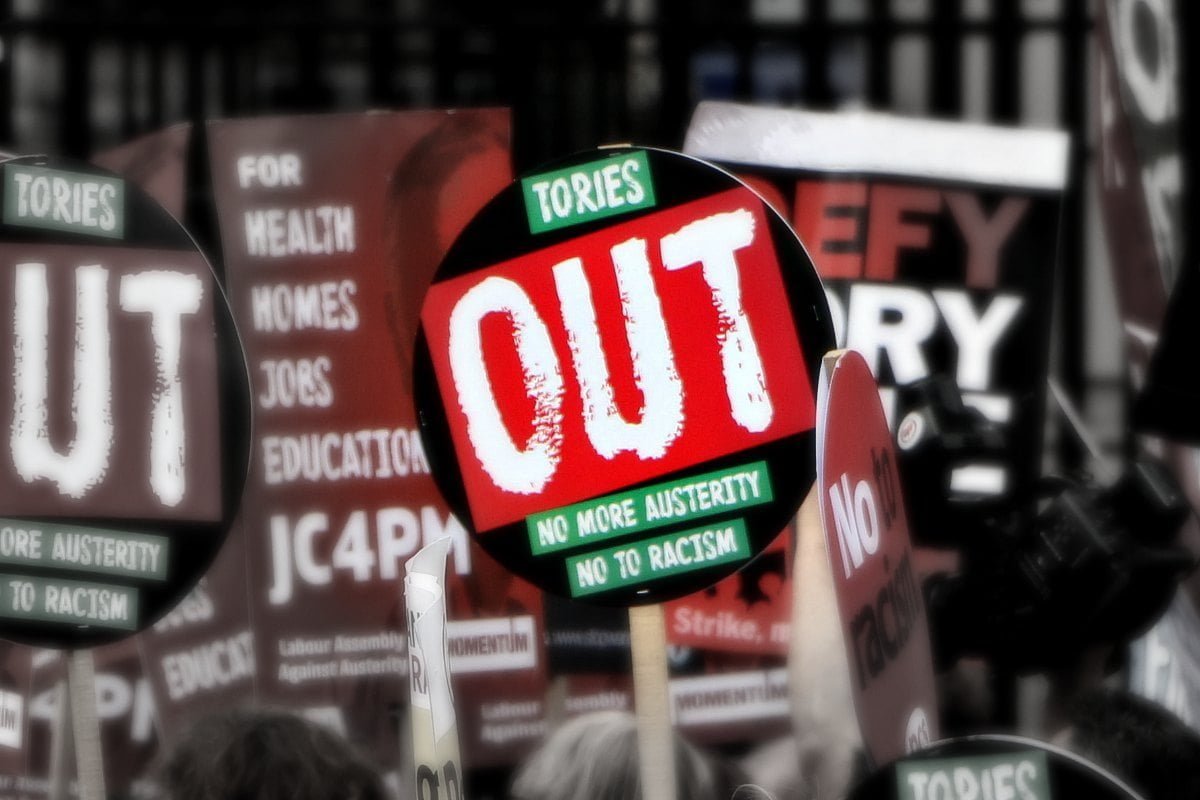 The seriousness of the situation is reflected by the pessimism of the strategists of capital. The more far-sighted bourgeois representatives understand the revolutionary implications of this situation.
The seriousness of the situation is reflected by the pessimism of the strategists of capital. The more far-sighted bourgeois representatives understand the revolutionary implications of this situation.
“The first is the need to be clear about the danger,” warns Jessie Norman, Conservative MP and historian. “Burke saw revolution coming to France in 1789, long before his contemporaries, in part because he knew its signs: a contempt for public authority, attacks on private property, a populist yearning to ignore inconvenient facts and rush to judgment. We see all of those things today.” (Financial Times, 23 June 2017)
This warning of revolutionary times ahead is no flight of fancy. They are worried by a whole series of factors that are developing at the present time. These include:
- A deep split within the ruling class, which, as Lenin explained, is the first condition of revolution.
- Loss of faith in the old order.
- Ferment and splits within the political parties.
- A growing politicisation, restlessness and polarisation in society.
- A deepening economic crisis, with no end in sight.
These are indicative of the nature of the period we have entered and the direction in which we are moving.
However, the political crisis will have a protracted and convulsive character, punctuated with ebbs and flows. It will be more similar to the Spanish revolution which unfolded over several years from 1931 and the declaration of the Republic until the May Days of 1937 in Barcelona. Within these years, there were periods of revolutionary advance and periods of reaction (e.g. the Two Black Years).
The reasons for this protracted nature of events are, on the one hand, the weakness of the subjective factor, and on the other, the weakness of the ruling class to impose a decisive solution. The working class, despite the setbacks, has not been defeated.
On the other hand, the ruling class cannot impose an authoritarian solution as in the 1930s, as this would provoke a social explosion. Such a path would be extremely risky for the bourgeoisie. For all these reasons the situation will be very protracted, extending over a period of years, with ups and downs.
The economic situation is becoming grave, and is set to become much worse. A bad outcome for Brexit would push Britain into a slump. But even without such a slump, the bourgeois economists forecast years of slow substandard growth, which would mean declining living standards amid further counter-reforms and attacks on conditions. This, in turn, will create the conditions for an intensification of the class struggle.
In the 1930s, Trotsky referred to Britain as an “arch conservative country” where the religion of capitalist progress has penetrated deeply into everything. This was certainly true of the past. Decades of reformism have had an effect on the consciousness of the masses.
There are still illusions that capitalism can be reformed. This idea is continually reinforced by the reformist leaders, especially the left reformists, who yearn for a gentler, kinder capitalism that can offer reforms and increased living standards, different to the “neo-liberal model”. They do not want to overthrow capitalism but to regulate it and make it more humane.
Workers on the move
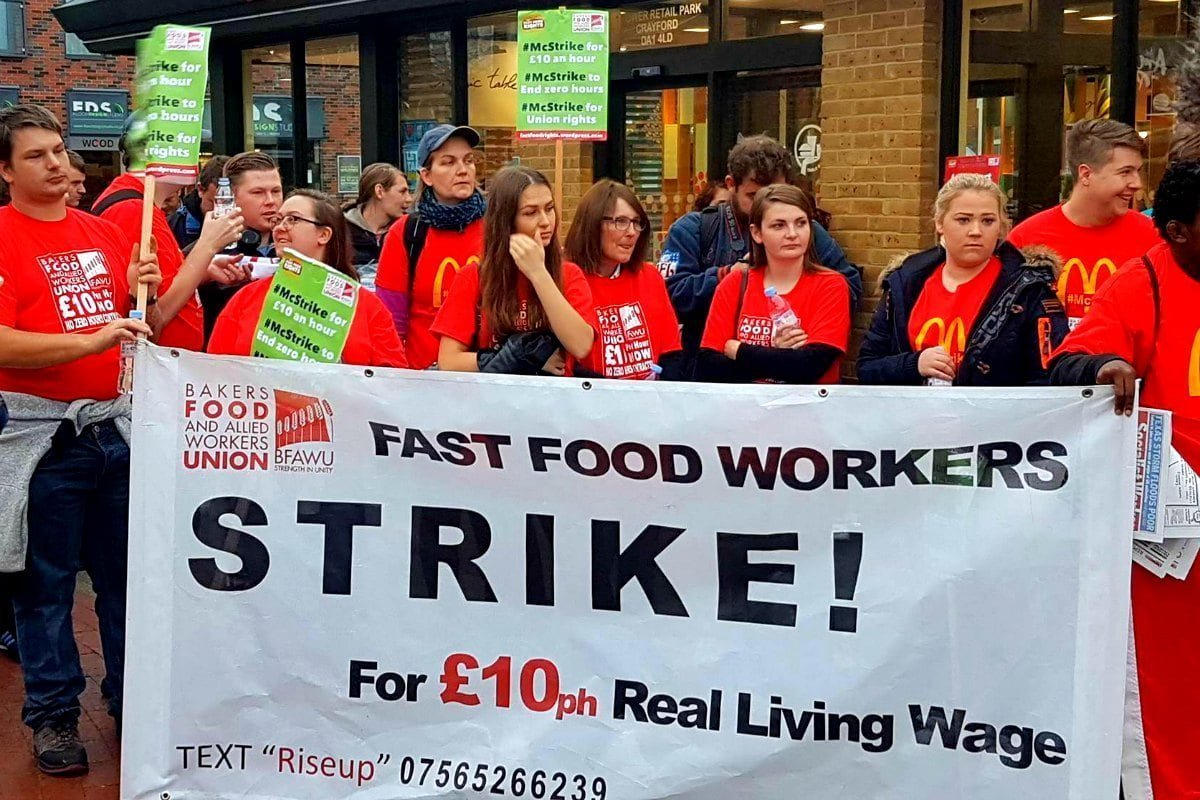 The illusions of the masses in capitalism, however, are more an expression of a lack of alternative rather than any real faith in the present system.
The illusions of the masses in capitalism, however, are more an expression of a lack of alternative rather than any real faith in the present system.
But confidence in capitalism is an article of faith for the tops of the trade unions and Labour Party, who have no belief whatsoever in the ability of the working class to change society and have long ago abandoned any perspective of socialism. Though they consider themselves to be great realists, they are actually the worst kind of utopians.
The trade union leaders, in particular, act as a brake on the movement. Trotsky referred to them as the most conservative force in society. “Putting the brakes on the struggle are the leaders who have lagged behind the masses”, he wrote. “Their own indecisiveness, their own conservatism, their own bourgeois prejudices are disguised by the leaders with allusions to the backwardness of the masses. Such is the true state of affairs at present.” (Trotsky, Discussion with a CIO Official, September 29, 1938).
The deep seated anger and frustration of the working class after years of attacks and cuts find no expression in the trade union leaders who have failed to mobilise this movement even to defend the most basic demands. They prefer to negotiate and conciliate with the employers, wherever possible, seeking to divert the energies of the masses away from militant action.
This has been aptly demonstrated by the recent examples of the UCU strike over pensions and the NHS pay deal. In both cases, union members have been told to accept rotten deals by their leaders.
The number of industrial disputes has been relatively low, although there has been strike action of the railway workers, cinema workers, bin workers, junior doctors, teachers, bus drivers, pilots, lecturers, and other layers. Many of these are new to industrial action.
The first ever strike at McDonald’s was an indication of the real mood, especially amongst younger workers. The potential certainly exists for a massive fightback, but the leadership is lacking across the board. There has certainly been a pickup of strikes in the private sector, but these have been generally isolated disputes.
The call for united co-ordinated action across different unions has been regularly made at the TUC, but never put into action. Resolutions are passed but then simply ignored. The 2011 dispute over pensions was a glimpse of what could be possible, involving millions of workers in unified strike action. But after letting off steam, the action was quickly shelved for fear it could get out of control.
After the general election, there was a build-up of pressure to break the 1% pay cap across the public sector imposed by the government. However, instead of leading industrial action, the union leaders have welcomed the local government employers’ offer of 2% this year and 2% next year. While more than 1%, this means a further wage cut when you take inflation into account. It also goes no way to restoring the cuts imposed over the last 10 years.
In addition, there is no government funding for these rises, which will inevitably mean cuts elsewhere, possibly involving redundancies. All the union leaders are doing is pleading with the government for extra funding, but proposing no action to back this up.
Where industrial ballots have been held they have attracted a very high turnout (easily surpassing the vote threshold barriers put in place by the Tories), whether on the railways or amongst postal workers. In the latter case, the employers turned to the courts to block the strike.
While the PCS have carried out a successful consultative ballot over pay, there has been no take up of the suggestion of building for united action, despite the clear willingness of the workers to struggle.
Looking to Labour
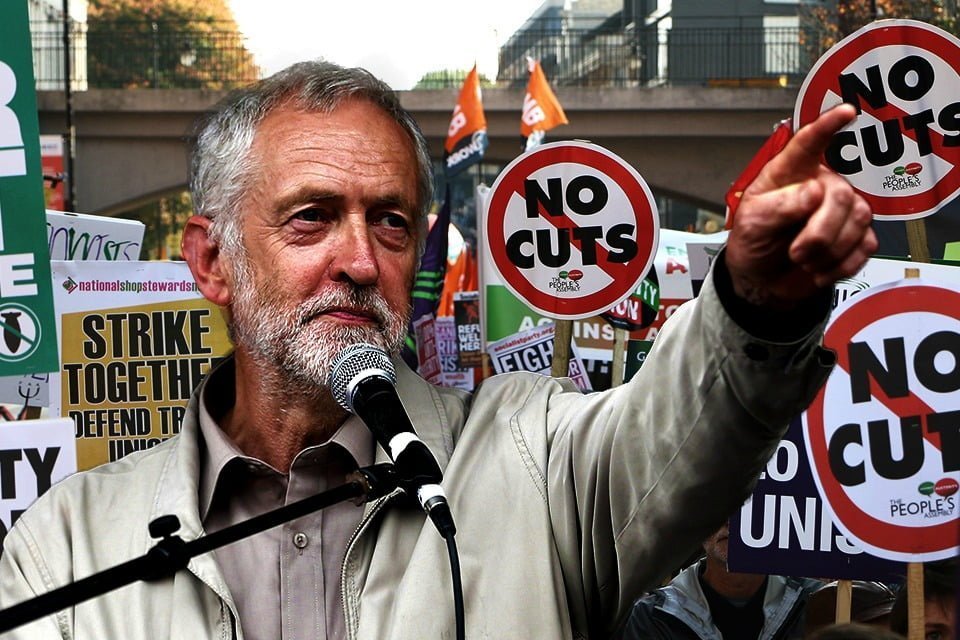 The TUC is playing a waiting game, with a national demonstration planned for Saturday 12 May. This is being called not to build for coordinated industrial action, but simply to let off steam.
The TUC is playing a waiting game, with a national demonstration planned for Saturday 12 May. This is being called not to build for coordinated industrial action, but simply to let off steam.
The atmosphere at the last TUC was palpably different from that at the Labour Party conference. While the Labour Party event was generally full of optimism, the trade union conference was staid. Some trade union leaders were saying they needed to get their act together. But even the best of them have no real plan or strategy. The trade union bureaucracy acts as a dead weight.
With the trade union membership being held back by the leadership, many members are now looking to the political front as a way forward. Industrial battles are still on the cards in different sectors, but this is increasingly overshadowed by the political field and the rise of the Labour Party. The election of Jeremy Corbyn as Labour leader has inspired many workers.
The attraction of the idea of a Corbyn government as a way forward for the working class is seen even in one of the most radical unions, the RMT. The union is now engaged in a process which will likely lead to reaffiliation to Labour.
With the increasing crisis in the Tory government, many are now looking towards a Labour government to solve their problems. The union leaders in particular are looking to Corbyn to reintroduce national collective bargaining and other trade union rights as a way forward.
Anger against the establishment
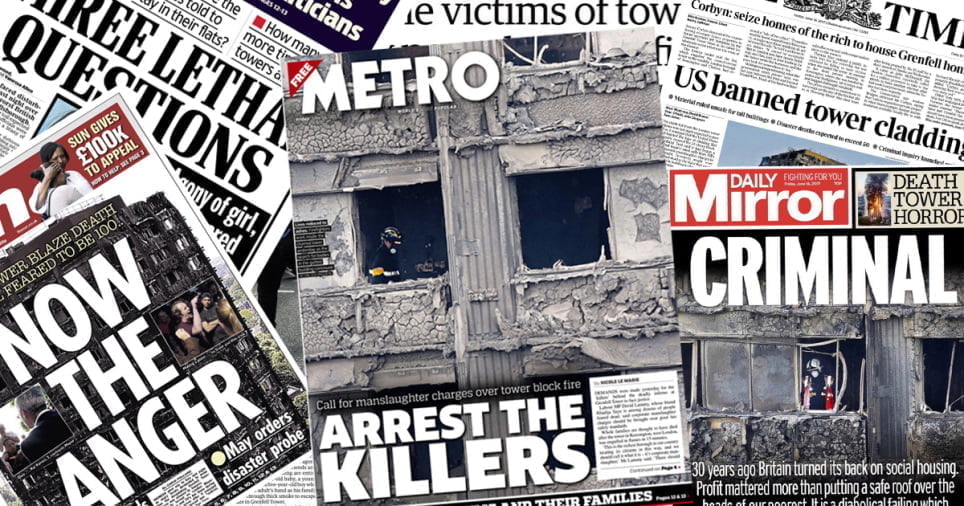 There is a growing anger throughout British society and a growing disillusionment with capitalism and its institutions (the ‘establishment’). There is a lack of confidence in public representatives: councillors, MPs and other officials.
There is a growing anger throughout British society and a growing disillusionment with capitalism and its institutions (the ‘establishment’). There is a lack of confidence in public representatives: councillors, MPs and other officials.
The Grenfell Tower disaster powerfully reinforced the sense of outrage and alienation, the idea that the powers-that-be are not interested in ordinary working class people, who are treated with contempt. This fuels the class anger in society.
The youth, in particular, who have been hit especially hard by the crisis, are becoming more radicalised, with a layer drawing revolutionary conclusions. They are a barometer of the general malaise and mood in society.
In April 2017, around 580,000 respondents in 35 countries were asked the question: would you actively participate in a large-scale uprising against the government in power if it happened in the next days or months? More than half of 18- to 34-year-olds said yes.
In Greece, the figure was 67%, in Italy, it was 65%, in Spain, 63%, France 61%, and the Czech Republic 59%. The next was Wales, with 57% in favour. Unfortunately we were not given figures for the rest of the UK, but there is likely to be a similar pattern. Of course, this is only symptomatic of the situation that is developing in Britain as well as in Europe.
The more astute strategists of capital can see where this is all leading. Anne Richards, chief executive of fund manager M&G, said: “In the current era, best described as ‘the age of anxiety’, we will see capitalism rejected unless it finds a way of fundamentally addressing this anxiety.”
Lenin pointed out that without the support of the Labour and trade union leaders, capitalism would collapse within six weeks.
Until very recently, the Labour Party was an important tool used by the ruling class to legitimise the system and keep the working class in check. When the Tories were doing badly, the ‘Second XI’ of the Labour Party – under right-wing control – were brought into government to clear up the mess. In doing so, they would discredit themselves and prepare the way for the return of the Tories. This was the general position since the war and provided a large degree of political stability.
This cosy arrangement has now ended. The bourgeoisie fear they have lost control of the Labour Party. Following the general election result, the prospect of the right wing regaining control is looking increasingly remote – at least for the immediate future.
On the other hand the Tory party at present is a very unreliable instrument. It is at war with itself and could split over Europe.

